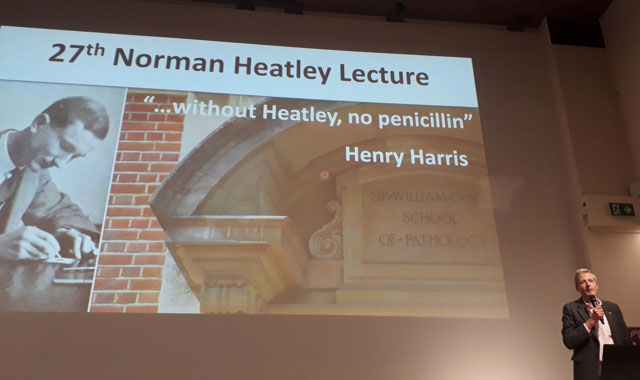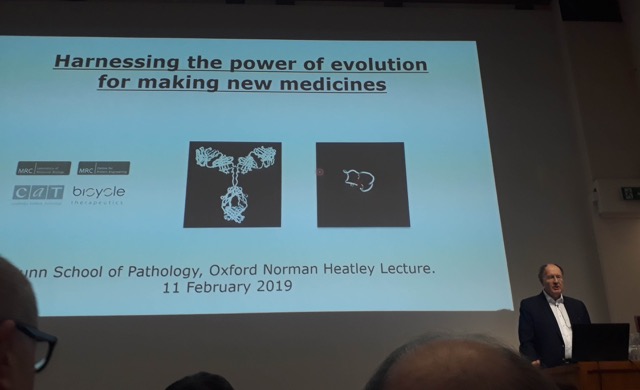Harnessing Evolution to Make Pharmaceutical Drugs: Sir Greg Winter Delivers the 27th Norman Heatley Lecture
The 27th Norman Heatley Lecture was delivered by Nobel laureate Sir Gregory P. Winter on 11th February 2019 at the Oxford Natural History Museum. Sir Greg Winter discussed his research on the production of antibodies suitable for therapeutic use, a new class of pharmaceutical drugs. This body of work resulted in the award of a shared Nobel Prize in Chemistry in October 2018.
The Norman Heatley Lecture is organised by the Sir William Dunn School of Pathology on an annual basis. Its delivery is held in honour of Norman Heatley, one of the scientists behind the development of penicillin, the first therapeutic antibiotic. Heatley began working alongside Howard Florey and Ernst Chain at the Dunn School in the late 1930s, isolating and purifying penicillin. Heatley is considered a somewhat forgotten figure in penicillin’s history since he was not recognised when the 1945 Nobel Prize in Physiology or Medicine went to the discovery of penicillin; Florey, Chain and Alexander Fleming shared the prize instead. However, as Head of Department Professor Matthew Freeman pointed out in his introduction, the Dunn School has excelled in promoting Heatley’s legacy in recent years.
It seems particularly appropriate that a lecture honouring one of the creative forces behind the first antibiotics should be given by Sir Greg Winter, whose work has contributed to antibodies becoming some of the best-selling therapeutics globally. As Matthew Freeman put it, “Sir Greg has probably done more than anyone in the world to apply the tools of fundamental molecular biology to transform human health. A third of new drugs are based on his technologies. Given the impact he has had on human health, he may be a rare case where the Nobel Prize itself is not his proudest achievement.”
Antibodies are proteins produced by the immune system that can recognise and bind to pathogens in response to the body becoming infected. Due to the high specificity of this binding, it was posited that antibodies might be used as a tool to recognise therapeutic targets, such as markers of tumours. In his lecture, entitled ‘Harnessing the power of evolution for making new medicines’, Winter first explained how he and his team ‘humanised’ rat antibodies, allowing them to be administered to patients. As part of a group that included the Dunn School’s former Head of Department, Professor Herman Waldmann, Winter and his colleagues demonstrated that this new technology could be used to recognise and remove large tumours in patients suffering from non-Hodgkin lymphoma. Despite this success, Winter wanted to go one step further and produce fully human antibodies. He discussed how immune cells displaying antibodies are able to recognise invading pathogens, and are activated when they do so. The cells begin to multiply and secrete large amounts of the cognate antibodies; these antibodies kill the pathogens or neutralise their activities. Winter referred to the immune response as “a little evolutionary system”. Winter sought to mimic this evolutionary process by displaying libraries of human antibodies on filamentous phage, and selecting for the cognate antibodies by binding the phage to an immobilised target. This has led to the development of several antibodies as pharmaceuticals, and it is for this approach that he received the Nobel Prize in Chemistry in 2018.
Sir Greg Winter concluded his lecture by looking to the future of antibody technologies in medicine, highlighting the ongoing and diverse work at Bicycle Therapeutics, a company that he co-founded in 2009. Following the talk, the attendees headed into the main atrium of the museum, where there was a drinks reception among the exhibits. The museum’s collection, showcasing the diversity of species produced over evolutionary millennia, provided a suitable contrast to the “evolution fast-track” that Sir Greg Winter has harnessed to revolutionise therapeutics.
Written by Laura Hankins

